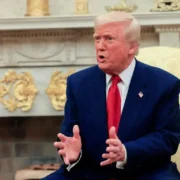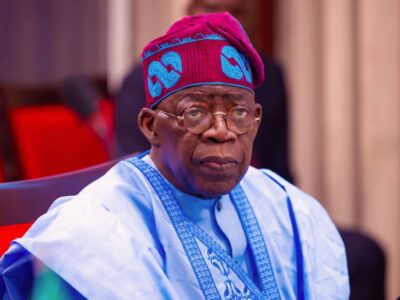In a dramatic escalation of tensions between Washington and Moscow, former U.S. President Donald Trump on Friday announced he had ordered the deployment of two nuclear submarines to undisclosed regions near Russia. The move marks a rare and serious insertion of nuclear strategy into what had largely been an online war of words with Russian officials over the Ukraine conflict and U.S. sanctions.
Trump, posting on his Truth Social platform, said the decision was prompted by what he described as “highly provocative statements” from Dmitry Medvedev, deputy chairman of Russia’s Security Council and a longtime ally of President Vladimir Putin.
“Based on the highly provocative statements, I have ordered two nuclear submarines to be positioned in the appropriate regions, just in case these foolish and inflammatory statements are more than just that,” Trump wrote. He added: “Words are very important, and can often lead to unintended consequences. I hope this will not be one of those instances.”
The former president did not specify whether the submarines were nuclear-powered or nuclear-armed, nor did he disclose their deployment locations. The U.S. Navy, as per protocol, does not comment on the movement of its nuclear assets.
In a later interview with Newsmax, Trump confirmed that the submarines were moved “closer to Russia,” stating, “We always want to be ready. I just want to make sure that [Medvedev’s] words are only words and nothing more.”
The former president’s comments came just hours after President Putin announced Russia had begun mass production of the new Oreshnik hypersonic missile — a nuclear-capable weapon Moscow says could be deployed in Belarus by the end of the year.
This exchange adds a dangerous nuclear dimension to the already fraught geopolitical climate surrounding Russia’s war in Ukraine. The Biden administration has not publicly commented on Trump’s latest remarks.
A Dangerous Exchange
The latest tensions were sparked by Medvedev’s online posts, in which he invoked Russia’s Cold War-era “Dead Hand” system — a rumored automated nuclear retaliation mechanism. Medvedev’s comments came in response to Trump’s threat of fresh sanctions if Russia does not take steps toward ending the war in Ukraine by next week.
Trump responded by branding Medvedev a “failed former President of Russia” and warned him to “watch his words,” claiming the Russian official was entering “very dangerous territory.”
“When you mention the word ‘nuclear,’ my eyes light up,” Trump told Newsmax. “And I say, we better be careful, because it’s the ultimate threat.”
Nuclear Forces on Alert
The United States and Russia collectively hold the vast majority of the world’s nuclear arsenal. While U.S. nuclear submarines regularly patrol international waters as part of the nation’s strategic triad — which includes land-based missiles and strategic bombers — their specific deployments are typically kept classified.
Trump’s public disclosure of such military movements is highly unusual and could risk further escalating tensions between the two nuclear powers.
Meanwhile, President Putin, speaking alongside Belarusian President Alexander Lukashenko on Friday, said preparations were underway to deploy the newly produced Oreshnik missiles in Belarus. “Most likely, we will close this issue by the end of the year,” Putin said.
Despite international calls for a ceasefire, Russia’s military campaign in Ukraine continues unabated. Ukrainian officials reported record drone attacks in July, with a deadly missile and drone strike on Kyiv Thursday killing at least 31 civilians, including five children.
Ukraine Renews Peace Calls
Ukrainian President Volodymyr Zelensky on Friday reiterated his willingness to hold direct talks with Putin, stating that both the United States and Ukraine support such a dialogue, and that only Russia’s readiness is lacking.
“The United States has proposed this. Ukraine has supported it. What is needed is Russia’s readiness,” Zelensky posted on X.
As nuclear rhetoric intensifies, observers warn that the risk of miscalculation between major powers is increasing. Analysts urge restraint and diplomacy to prevent the already devastating Ukraine conflict from spiraling into a broader global crisis.




















Comments